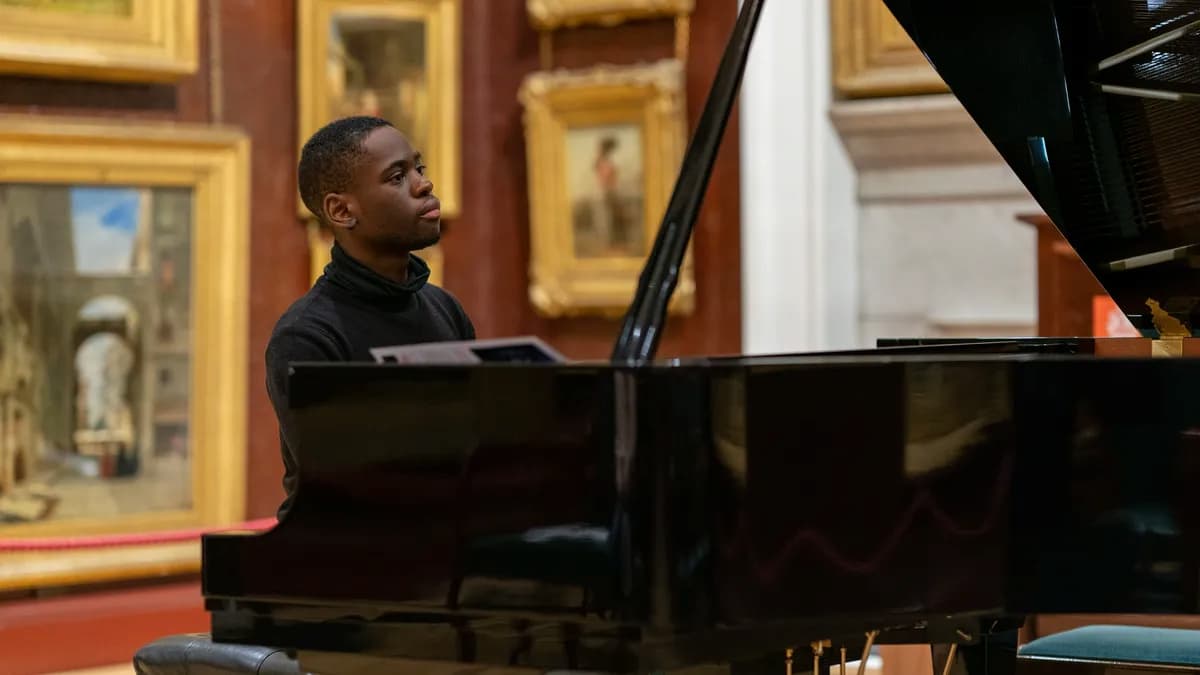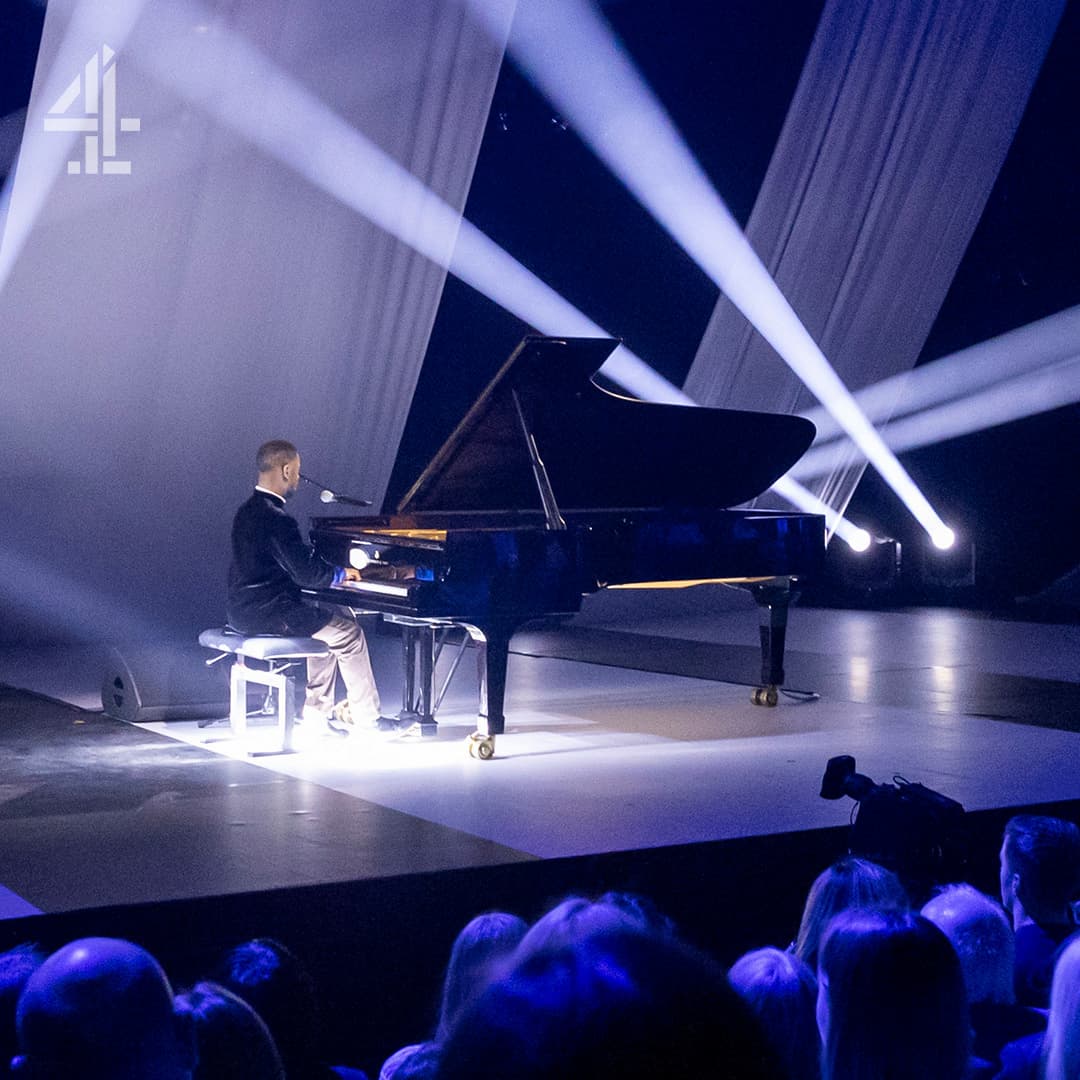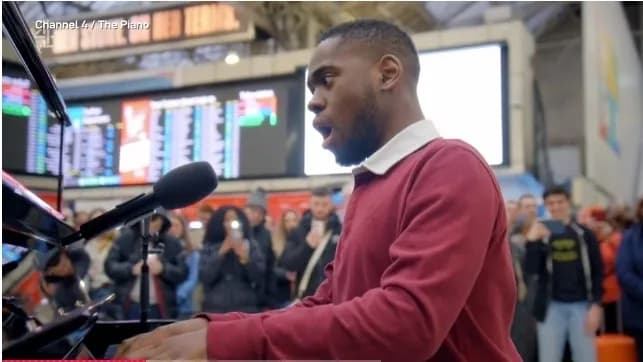Described by superstar pianist Lang Lang as ‘A genius…The new Bach’ during his performance on Channel 4’s popular and inspiring programme The Piano (UK tv), Michael Howell is a young self-taught composer, singer and pianist from a working-class Caribbean-Jamaican background in west London.

Praised for his other-worldly counter-tenor voice and his ability to touch audiences with his lyrical operatic language and Baroque-inspired piano accompaniment, Michael’s performance in London’s Victoria Station had the audience spellbound and secured him a place in the programme’s final, where he performed his own composition, ‘Great Is The Grief’. The piece uses ‘Echolalian’ (abstract-vocalism), an operatic language he invented himself to connect the listener to the music in a way that is purely musical and goes beyond linguistic understanding.
Great Is The Grief by Michael Howell
‘This is incredible….This is a pure talent. This is really something that’s very rare. It sounds like a new Bach is born from the middle of a train station in London.’ – Lang Lang
Dealing with the twin challenges of autism and ADHD, by the age of 11, Michael could play Mozart, having taught himself to play the piano through a phone app. He was inspired to start composing his own music by listening to classical music and opera on YouTube, and he wrote his first work at the age of 12. His own unique music is drawn from baroque and romantic genres, jazz and gospel. He brings a new dimension to music: difficult to categorise, yet always beautiful, engaging and heartfelt.
We spoke to Michael to find out more about his musical life, the experience of performing on tv and his advice for aspiring musicians….
What inspired you to take up music? Was there something early on in your life that inspired you?
I’ve always had a natural tendency to be drawn to music. I remember as a child growing up, around 6 or 7, I always used to hum, always sing to myself and hum melodies out loud. I was known at school to be disruptive because that’s how prevalent my joy for music was: humming in the classroom till some teachers said, “You’re, you know, you’re distracting the class”. Well, I couldn’t help it because I’ve always had a natural instinct for music.
There was one defining moment at the age of 11 when I decided that I wanted to become a musician. I was inspired by a phone app that taught me all the iconic pieces, Fur Elise, the Turkish March, and all this wonderful piano repertoire – minuets by Mozart and sonatas by Haydn, And through that app, I started to discover all these classical composers. I was not just fascinated by learning the music through this app, but I was particularly fascinated delving into the other repertoire that they composed. I wanted to know, you know, who is Mozart? what other pieces did he write? And then that’s when I discovered his symphonies, his concertos and then other composers, from Haydn to Bach to Vivaldi to Buxtehude and Lully, you know, all these composers! I just had this particular fascination with history, especially the Baroque period. I was absolutely obsessed with the 17th and 18th centuries and the music of that period. That’s where my fascination grew, and I decided that I primarily wanted to perform my own pieces and write my own compositions.
It was quite unique, you know, especially coming from a Caribbean Jamaican background. My family doesn’t know anything about classical music, so that kind of deep fascination is quite special. Also, I went to a state school where there was nothing like classical music in the mainstream music studies.
What have been the challenges in your musical career so far?

Michael Howell in Ch 4 “The Piano” final concert © channel 4
This may surprise people, but I do find it difficult to write down my music. I have a great sense of classical music and know it very well in its style and the flow of things. But I have struggled with reading music and writing it down, and that has been a challenge ever since. I compose music in an aural way: I hear music in my head and then play it on the piano. Then I remember the structure and the harmony, and that’s how I’ve been writing music. I use composing software such as Logic Pro or Cubase.
Prelude in B flat minor by Michael Howell
How do you feel about performing?
I do find it nerve-wracking, but I love to put a smile on people’s faces, I love to surprise them with my voice, and I love to entertain people. There’s one special moment from Victoria Station in London [when performing on The Piano tv programme]. I had finished my performance, and I had to walk away from the piano and do a short interview. I noticed a woman standing next to the cameraman while I was doing the interview. She waited very patiently until I had finished and then she gave me a big hug – she was almost emotional – and she also gave me some cash. I was absolutely taken aback, but I will never forget that moment: somebody who didn’t know me, somebody I didn’t know; but I could tell by her hug that she was very touched by my performance. And I will always remember that moment. It reminds me that people need music. You know you’re not doing this just for yourself. You’re doing this for humanity, for people, because people love what you do. And there’s something quite special, even spiritual about my music, and I think people need that, especially at this time.
How has your appearance on The Piano tv show influenced your musical development?
While I was doing the consultation with Mika [singer-songwriter and a co-judge on The Piano], I learned that I had to keep the balance between technique and heart. And I think I need to get back to the stage where I’m not so fussy about technique, and remember to showcase the emotion. It’s important not to be too much of a perfectionist and to turn that [perfectionist] voice down because it can take over, and then I start to get too self-critical and lose the flow of the music.
What advice would you give to young or aspiring musicians and composers?

Michael Howell performing at Victoria Station
Three things. First, don’t be afraid to sound bad. That’s how we learn and how we grow. It’s okay to make mistakes, and the acceptance of sounding bad is the beginning of freedom and confidence.
Secondly, never stop playing or singing, even if it’s just five minutes. It’s better to do music for five minutes a day than to miss one day of practicing or performing music.
Finally, and this is a very honest opinion, manage your well-being through expectation. So I would say, do music for love and pleasure first, and then the rest will follow; not the other way around, where we do music for money and business. As everyone knows, the road of a musician is very rough. It’s very rough, and it takes time. So it’s important to manage your expectations and to focus on the love and pleasure of music rather than the money, the business and the career because if you focus on that, then it will take away some of that innocence that you had when you first began loving music.
For more of the best in classical music, sign up for our E-Newsletter




